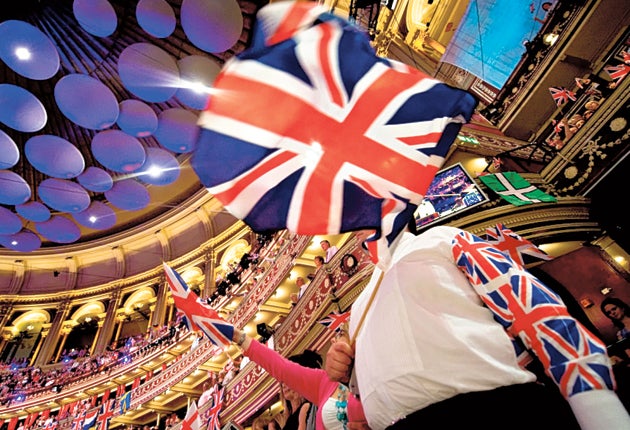Proms makes history with two last nights

Your support helps us to tell the story
From reproductive rights to climate change to Big Tech, The Independent is on the ground when the story is developing. Whether it's investigating the financials of Elon Musk's pro-Trump PAC or producing our latest documentary, 'The A Word', which shines a light on the American women fighting for reproductive rights, we know how important it is to parse out the facts from the messaging.
At such a critical moment in US history, we need reporters on the ground. Your donation allows us to keep sending journalists to speak to both sides of the story.
The Independent is trusted by Americans across the entire political spectrum. And unlike many other quality news outlets, we choose not to lock Americans out of our reporting and analysis with paywalls. We believe quality journalism should be available to everyone, paid for by those who can afford it.
Your support makes all the difference.If you were to travel back to the Last Night of the Proms in 1910, you would see 3,000 people paying their threepence to listen to Edward German's comic operettas and Dorothy Forster's fashionable songs.
In other words, you'd spend the evening listening to popular turn-of-the-century compositions that have long since been lost to obscurity, with no rousing singalongs of the hymn "Jerusalem" or Elgar's "Land of Hope and Glory" (although there would at least have been a rendition of "Rule, Britannia!").
But those who feel nostalgic for this bygone era can now re-live that concert, free of charge, at a retro-Last Night of the Proms set to run alongside the regular series of concerts this summer. Richard Wright, controller of BBC Radio 3 and director of the Proms, yesterday announced that for the first time in their 115-year history, the Proms would put on two "last night" performances to give concert-goers a flavour of past and present. Dressing up in period costume for the 1910 performance, Wright added, was optional.
The 1910 "last night" on 5 September will include compositions by Proms founder Sir Henry Wood, as well as a parade of short popular classics and new works which Wood called his "novelties". One short cello piece from the 1910 programme will be replaced by a new work based on a movement from the unfinished Cello Concerto by Vaughan Williams.
Wood's Fantasia on British Sea-Songs will include horn pipes and end with "Rule, Britannia!". In the course of the nine-week Proms season, which begins on 16 July, there will also be a recreation of a 1962 Prom by the Scottish Symphony Orchestra. "It's a snapshot of Proms history," Wright said.
The announcement follows his decision in 2008 to recreate a Prom which premiered a Mahler symphony in 1904, which proved a great and unexpected success.
The other Last Night of the Proms on 11 September, which will bring this year's season to an end, will feature an eclectic mix of music. As well as the traditional staples such as "Jerusalem", Elgar and Tchaikovsky, there will also be mass singalongs of Rodgers and Hammerstein's "You'll Never Walk Alone" and Wagner's "Lohengrin – Bridal Chorus". It is the first time that the 6,000-strong audience will have been invited to sing at such length.
Wright said he decided to add the retro-Last Night and other eccentric peculiarities to the programme because he hoped to recreate the "ukulele effect" of last year – referring to the phenomenal success of the Prom performed by a ukulele orchestra, in which thousands of audience members brought their own musical instruments to the Royal Albert Hall and joined in.
"What I mean by the 'ukulele effect' is the ability to bring in audiences that may not normally come to a Prom," he said. "Last year we saw a huge rise in young people connecting with the Proms and hopefully seeing a life-changing performance."
Enjoy unlimited access to 100 million ad-free songs and podcasts with Amazon Music
Sign up now for a 30-day free trial
Enjoy unlimited access to 100 million ad-free songs and podcasts with Amazon Music
Sign up now for a 30-day free trial
Less traditional shows on the programme this year include the return of the Dr Who Prom, which was so popular in 2008 that tickets were sold for hundreds of pounds on eBay.
A night dedicated to the musicals of Stephen Sondheim will also feature, at which the American composer will be present in person. There will also be a night devoted to the musicals of Rodgers and Hammerstein, and jazz singer Jamie Cullum will be performing for the first time, as will the young violinist Nicola Benedetti. The famous tenor Placido Domingo will also return for his second performance at the Proms.
Tickets for the concerts go on sale on 4 May
Blast from the past
The 1910 Prom will kick off with a rousing overture from Wagner's 'The Flying Dutchman'. It will feature popular compositions from the turn of the century, such as the three minute song, "Mifanwy", by Dorothy Forster, a friend of Proms' founder, Sir Henry Wood.
The piece was highly fashionable in the 1910s and 20's and performed regularly at Proms until 1924. There will also be an operetta by Sir Edward German, best remembered as a successor to Arthur Sullivan in English comic opera.
The piece is from the 1902 opera, 'Merrie England' entitled 'Who were the Yeoman of England?' A fantasia on the British Sea Songs, composed by Sir Henry, which ends with Rule, Britannia!, will be staged, with Elgar's 'Pomp and Circumstance March No 4', and the National Anthem, to finish.
Join our commenting forum
Join thought-provoking conversations, follow other Independent readers and see their replies
Comments